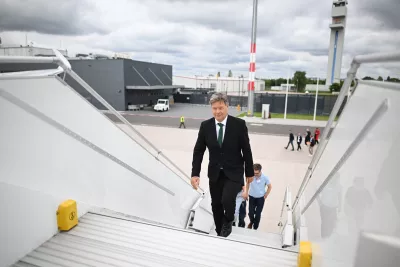Habeck must prioritise China's climate policy

picture alliance/dpa | Sebastian Christoph Gollnow
This text was first published by Climate.Table and China.Table on 20 June 2024.
The global energy transition is unattainable without China. Therefore, Robert Habeck should emphasise climate policy relations during his visit to Beijing. Here are six proposals for pragmatic co-operation between Germany and China to benefit climate action.
Robert Habeck will arrive in China on Friday for his first visit as Minister for Climate Action. His presence is especially significant because China is undoubtedly the key player for successful global climate action in multiple ways:
- First, without a rapid reduction in Chinese emissions over the next five years, the Paris Climate Agreement's goal of limiting global warming to 1.5 degrees Celsius cannot be achieved.
- Second, other countries cannot reduce their emissions at the necessary pace without China's capacity to produce affordable renewable energy, batteries, and electric vehicles.
- Third, the stability and credibility of international climate protection rules hinge on China's actions in the coming months – especially if Donald Trump is elected US President in November. The Paris Agreement is likely to survive only if the EU, China, and other countries like Brazil clearly commit to their obligations.
It is, therefore, high time for the German government to prioritise climate policy relations with China. Important foundations have been laid since the beginning of this legislative term with the climate foreign policy strategy, the China strategy and the transformation dialogue agreed upon a year ago between Germany and China.
Now it is crucial to implement a realistic and strategic China climate policy. The guiding principle should be 'pragmatic co-operation'. This means co-operation in areas where it is still sensible and possible, but also clearly defined expectations and a different approach to third countries.
Diversified and sustainable supply chains, coal power
Robert Habeck can set priorities in Beijing in the coming days in six areas: First, he should acknowledge that we will continue to need large-scale imports from China for the necessary transformation but also explain why Europe wants to diversify its supply chains in future technologies like renewable energy and electromobility. This includes building its own production capacities, but not closing the market.
Second, he should demand that the ecological and social conditions in the supply chain – for example, for solar cells – improve. The use of forced labour or exclusive reliance on dirty coal power is unacceptable. German and European supply chain law are the best tools to achieve actual improvements because they are binding for all large companies. Habeck's public consideration of 'suspending' the German law did not strengthen this position's credibility. It is, therefore, important that he clarifies that binding due diligence obligations are coming and how China can create the necessary transparency for this.
Third, the high share of coal-fired power generation remains China's biggest climate policy problem. The minister should set clear expectations: China must finally adhere to its 2021 commitment to strictly limit the increase in coal power plants and initiate a coal phase-out in the next five-year plan. Simultaneously, Robert Habeck can offer enhanced exchanges between experts from both countries.
Diversity of actors, climate targets, global support
Fourth, co-operation with Germany can help strengthen a diversity of actors in Chinese climate policy beyond the central government. For example, the transformation dialogue includes co-operation with provinces – a sensible approach. Additionally, the German side should push for the inclusion of experts from research institutes and civil society from both countries in exchange and co-operation formats.
Fifth, it is no exaggeration to say that future global warming largely depends on China's new climate target for 2035, which China – like all countries – must submit to the UN by February 2025 at the latest. So far, signs indicate that China intends to meet this deadline but does not plan an adequately ambitious target. This must be addressed in all high-level discussions – it helps if the Vice Chancellor of the largest EU member state emphasises the importance of this issue. This will only be effective if Habeck can also commit to the EU presenting an ambitious target for 2035 and 2040 aligned with the 1.5-degree limit as early as possible.
Sixth, Robert Habeck should propose that China and Germany jointly do more to support other countries in their energy transitions. An accelerated global energy transition can alleviate trade tensions over green technologies. Even if the EU wants to reduce the share of Chinese imports, this does not have to mean a decline in demand for Chinese products if coal-dependent countries like Indonesia, India, or South Africa accelerate their energy transitions and rely largely on technology from China.
Author(s)Martin Voss, Lutz Weischer |
|
CitationVoß, M., Weischer, L., 2024, Habeck must prioritize China's climate policy |


